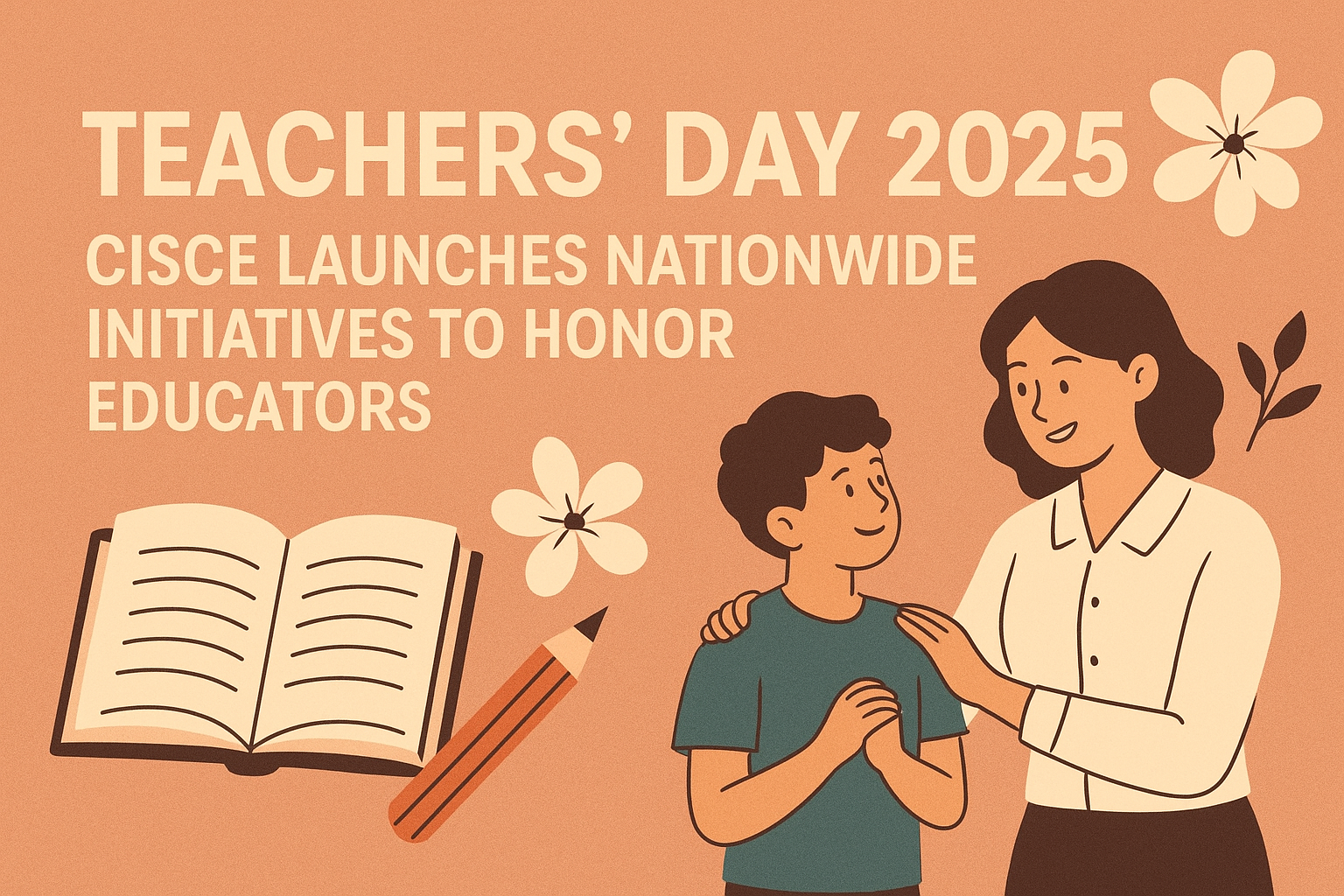Every year, September 5 is marked with gratitude, nostalgia, and celebration as India honors its teachers. In 2025, the Council for the Indian School Certificate Examinations (CISCE) has gone a step further, announcing a series of nationwide initiatives that remind us why teaching is more than a profession—it’s a calling.
Dr. Sarvepalli Radhakrishnan, whose birthday we celebrate as Teachers’ Day, once said, “The true teachers are those who help us think for ourselves.” CISCE’s fresh initiatives feel like a continuation of that philosophy—recognizing teachers not only as transmitters of knowledge but as architects of critical thinking and humane values.
A Movement That Recognizes Teachers as Nation Builders
CISCE’s announcements focus on creating structured platforms to honor teachers across the country. From institutional recognition programs to workshops highlighting innovative pedagogy, the council is ensuring that the narrative around teaching shifts from “duty” to “inspiration.”
This is important because too often, Teachers’ Day becomes symbolic—flowers, speeches, and cultural programs. While those gestures matter, what educators truly need is sustained recognition, professional development, and a sense that their contribution is woven into the nation’s growth story.
By anchoring these initiatives in a nationwide movement, CISCE seems to be saying: teachers are not just classroom guides; they are cultural carriers and catalysts of change.
Stories That Deserve a Larger Stage
When we think of teachers who shaped our lives, it’s rarely about textbooks. It’s about the one who stayed after class to explain a math problem, the one who saw potential when others didn’t, the one whose words still echo in our decisions years later.
CISCE’s plan to bring teacher-led innovations and community contributions into the spotlight is perhaps the most powerful aspect of these initiatives. Imagine a national stage where a small-town science teacher’s experiment, a literature teacher’s creative approach to storytelling, or a history teacher’s method of making local heritage come alive for students is celebrated like a national achievement.
That kind of recognition changes everything—it validates the heart of teaching.
Why This Matters in 2025
India’s education system is undergoing seismic shifts: NEP 2020 reforms, integration of digital learning, and the rise of AI tools in classrooms. Yet, amid all the talk of technology and policy, teachers remain the cornerstone.
CISCE’s move is timely because it rebalances the conversation. In a world where students are learning coding at ten and AI can generate lesson plans in seconds, it’s easy to forget that empathy, encouragement, and wisdom can’t be automated. Teachers still provide the human context that makes learning meaningful.
As American historian Henry Adams put it: “A teacher affects eternity; he can never tell where his influence stops.” In 2025, that influence might stretch across both chalkboards and touchscreens, but its essence remains unchanged.
A Chance for All of Us to Rethink Gratitude
The initiatives by CISCE should also be a cue for the rest of us. Gratitude for teachers shouldn’t be boxed into a single day—it can be as simple as writing a note to a retired teacher, mentoring younger educators, or valuing the profession in policy and pay structures.
It’s easy to celebrate cricketers and film stars; it’s harder to celebrate the quiet strength of someone who taught us discipline, logic, or compassion. CISCE’s efforts remind us to do exactly that.
Why This Teachers’ Day Marks a Turning Point
Teachers’ Day in India has long been a day of gratitude, often steeped in nostalgia. But 2025 feels different. With CISCE’s nationwide initiatives, the occasion takes on a forward-looking spirit—less about memory, more about momentum.
If India is to truly become a knowledge-driven society, celebrating educators isn’t just symbolic—it’s strategic. Teachers shape not only the future workforce but also the nation’s values, resilience, and innovation. This year’s programs remind us that honoring teachers must go beyond rituals; it must become part of our everyday consciousness.
As Dr. Radhakrishnan, whose birthday anchors this day, once said, “The true teachers are those who help us think for ourselves.” Perhaps 2025 will be remembered as the year we took that message seriously—by not just thanking our teachers, but by walking further on the paths they helped us find.
Frequently Asked Questions
Why is Teachers’ Day celebrated in India?
Teachers’ Day in India is celebrated every year on September 5 to honor Dr. Sarvepalli Radhakrishnan, a respected philosopher, teacher, and the second President of India. The day recognizes the pivotal role teachers play in shaping young minds and the nation’s future.
What new initiatives has CISCE announced for Teachers’ Day 2025?
The Council for the Indian School Certificate Examinations (CISCE) has launched nationwide programs, including teacher workshops, student-led gratitude campaigns, and collaborative activities across schools. The goal is to make Teachers’ Day more participatory, forward-looking, and impactful.
How are these initiatives different from previous years?
Unlike traditional celebrations that often focus on ceremonies and performances, the 2025 initiatives emphasize innovation, student-teacher collaboration, and long-term recognition of educators. This approach makes the day less about ritual and more about driving momentum in education.
Who can participate in the CISCE Teachers’ Day activities?
Both teachers and students from CISCE-affiliated schools nationwide are encouraged to take part. The activities are designed to engage entire school communities and highlight the evolving role of teachers in modern education.
Why do initiatives like these matter for India’s future?
Strong education systems depend on empowered, respected teachers. By celebrating and supporting educators in meaningful ways, India strengthens its path toward becoming a knowledge-driven society—where innovation, values, and creativity thrive.

